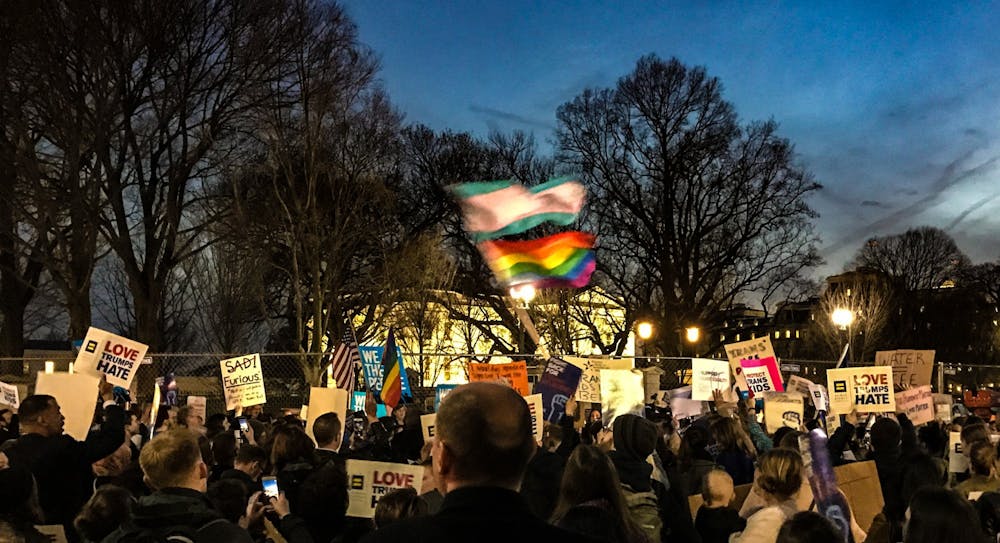
Florida's "Don't Say Gay" bill was passed in late March 2021 (Photo by Ted Eytan | CC BY-SA 4.0).
The Sunshine State has just become a shade darker.
On March 28, Florida Gov. Ron DeSantis officially signed House Bill 1557, banning public school teachers in Florida from holding classroom discussion about sexual orientation or gender identity. The Parental Rights in Education bill, also known as Florida’s “Don’t Say Gay” bill, will officially take effect on July 1, 2022.
According to the legislation, “classroom instruction by school personnel or third parties on sexual orientation or gender identity may not occur in kindergarten through grade 3 or in a manner that is not age-appropriate or developmentally appropriate for students in accordance with state standards.” The bill does not specify what constitutes age-appropriate discussions or who ultimately decides the topics allowed and not allowed inside classrooms.
While the entire bill is intentionally vague and does not even mention the words "gay" or "transgender", under the bill’s cloak of neutrality is a discriminatory legislation that is making disadvantaged teenagers’ lives even harder. In fact, its vagueness could encourage conservative parents to punish the violators in classrooms by filing lawsuits against schools or teachers, further stoking the fire of “snitch culture” within the Republican Party.
The intentional ambiguity may also backfire. The legislation’s language indicates that any kind of discussion on gender and sexuality is prohibited in classroom instruction, including heterosexuality. An ongoing lawsuit brought forth by Florida residents and LGBTQ groups has already challenged the statutes. The suit argues that the new law is not intent on banning discussions of sexual orientation on “non-LGBTQ people.” It has no intention to stop the teachers from maintaining “the normalcy of opposite-sex attraction while teaching literature,” or to ban “run-of-the-mill references” to people’s heterosexuality.
In their filed complaint, the plaintiffs claim that “anyone who discusses or acknowledges any aspect of LGBTQ identity must fear running afoul of the law, while it is simply taken for granted that discussing heterosexuality or cisgender identity in school settings is perfectly fine." Prohibiting discussions on gender identity and sexual orientation deters teachers from discourse on sensitive topics, as they may fear that initiating the discussion will result in lawsuits from outraged parents.
Students might also feel deterred from asking teachers or counselors for help. The bill requires school officials to notify parents when their children receive mental, emotional, or physical health services to allow parents “to make decisions regarding the upbringing and control of their children.” This requirement appears to have no limitation on the students’ age, grade level, or circumstances unless there is a risk of “abuse, abandonment, or neglect.”
Supporters of the bill are concerned about how school officials would react to and advise students who question their gender identity and sexuality. But, counselors worry that an expansive privilege to disclose student counseling information to parents, save only for the most extreme cases, could discourage students from seeking help.
Representation and inclusiveness are not hollow words. They contribute to the well-being and mental health of minority students who may already be insecure about their identities. Research from the Trevor Project, the largest suicide prevention and crisis intervention organization for LGBTQ youth, shows that schools that actively affirm students’ gender identities report lower rates of attempted suicide by LGBTQ youth. Similarly, LGBTQ youth who learned about LGBTQ issues or people in school were 23 percent less likely to attempt suicide.
Schools should be a place where every student gets to thrive and learn about the diverse groups of people in this country. Education should be about learning the ways to build a kinder, more inclusive, and loving community for everyone. Unfortunately, there are still laws and bills in session that prevent educators from discussing LGBTQ people or topics.
According to the American Civil Liberties Union, there are currently more than 100 anti-LGBTQ bills in this legislative session, and a majority of the bills come from state legislatures across the country. Another analysis from CNN reports that there have been more than 150 anti-LGBTQ bills introduced so far this year at the state level. Soon after the creation of Florida’s bill, Alabama created House Bill 322 — almost copying the Don’t Say Gay bill word for word, requiring teachers not to “engage in classroom discussion … regarding sexual orientation or gender identity in a manner that is not age appropriate.”
Vulnerable students across the country are being used as bullets by Florida legislators to win a few political points. But beneath the contentious wars between political parties are school-aged youth who are forced to spend most of their time in a state that prohibits public schools from sharing or affirming their own identities and backgrounds.
SAM ZOU is a College junior studying political science from Shenzhen, China. His email is samzou@sas.upenn.edu.
The Daily Pennsylvanian is an independent, student-run newspaper. Please consider making a donation to support the coverage that shapes the University. Your generosity ensures a future of strong journalism at Penn.
Donate






